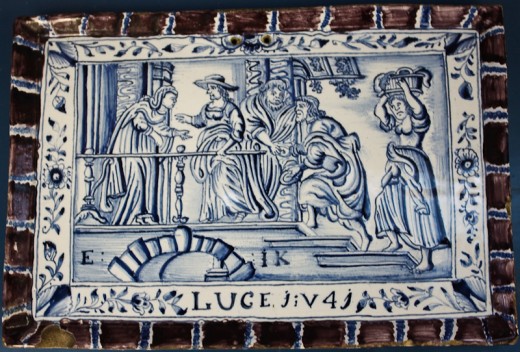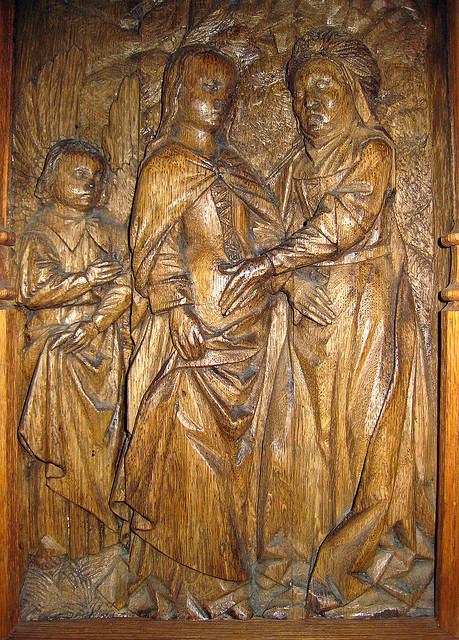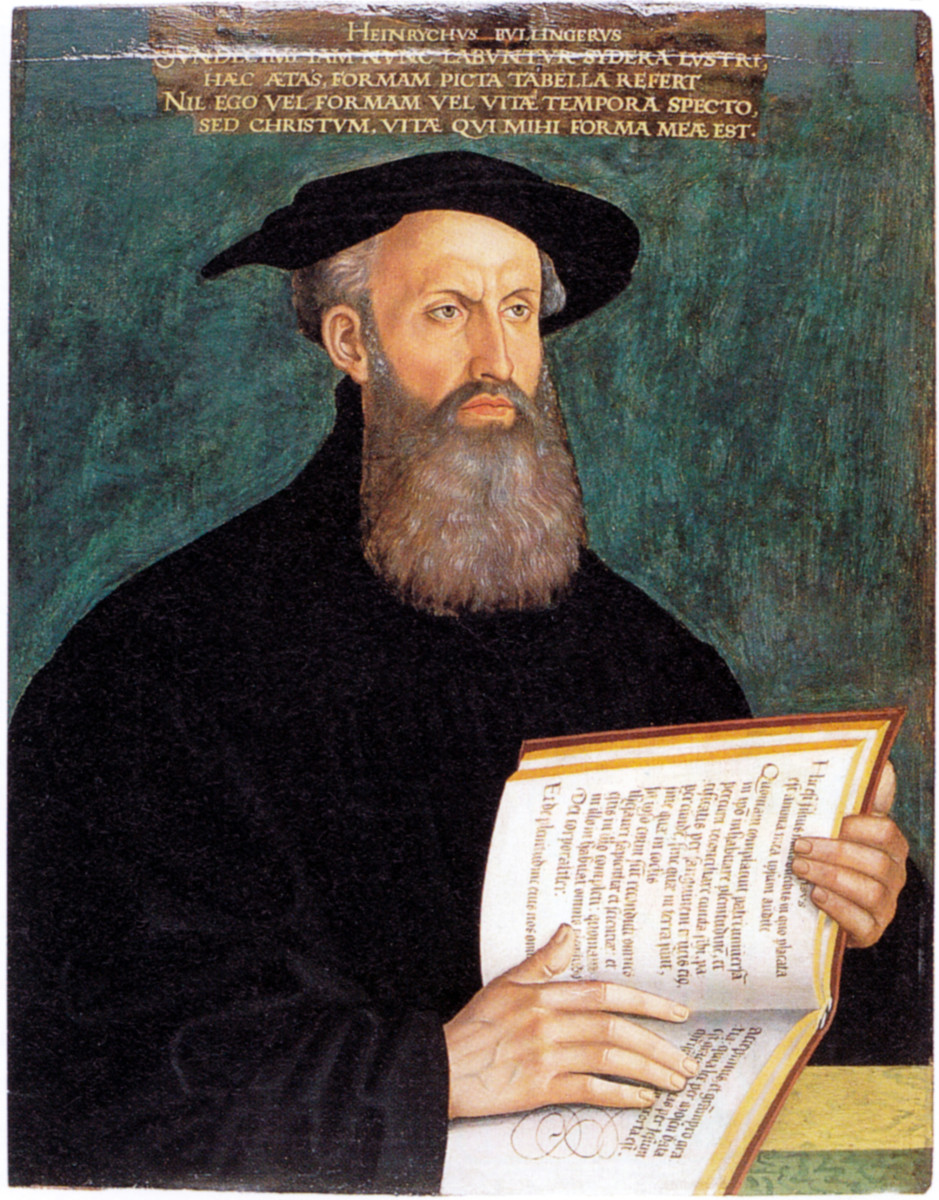Nobodies of the Bible: Elizabeth and the birth of Jesus

Elizabeth was the wife of a priest, but not one of the important ones. She and Zacharias lived in the hill country of Judea, and he only went to the temple twice a year. Perhaps their whole village was other priests. In any event, he would have had to ply an ordinary trade, just like anyone else. Any boost in status Elizabeth might have gotten from being a priest's wife paled in comparison to her shame. She was an old woman (and I suspect that 40 or even 35 counted as old in those days) and childless. In the Bible, Elizabeth is known only as the wife of Zacharias, hardly an important figure himself, and a relative of Mary. As big a deal as that may be to us as part of the story of the birth of Jesus, all it meant in her day is that she had kin among the poor country bumpkins of Galilee.
Elizabeth's story appears in the first chapter of Luke, where we learn that she was descended from Aaron and therefore of the priestly line (1:5). We also learn that she was related to Mary, who was descended from David and therefore of the royal line (1:27, 36). Assuming they both descended from their illustrious ancestors through their fathers, then Elizabeth's mother may have been descended from David or Mary's from Aaron. Elizabeth may have been Mary's aunt. Some translations suggest cousin, but Luke does not specify the relationship.

Luke says some other things about Elizabeth that we should explore in some detail before considering his main narrative about her. She and her husband were righteous in the sight of God, something not said of very much of the priesthood throughout the entire Bible. They both walked blamelessly in all of God's commandments and requirements. Does the Bible say that about anyone else at all? Job comes to mind as one possibility. I certainly can't find anyone else, but the comparison with Job serves as a reminder that God allows his most faithful people to live through some difficult challenges.
Their friends and neighbors, not having the chance to read Luke, didn't know that God considered Zacharias and Elizabeth blameless. All they knew was that Zacharias, although one of the older priests, had never been selected by lot to burn incense in the temple and that Elizabeth was childless. Most of them wouldn't have thought of Job. Most of them would have assumed that somehow these two were not as good as they seemed and that God must be punishing them for some hidden sin. The more gossipy people in town probably tried to figure out what might be wrong with them. They may have even seen fit to pass on their wisdom and good advice to the unhappy pair themselves.
Don't we all know Elizabeth now? Elizabeth did all the right things, yet God withheld her greatest desire. She knew stories of other barren women in the Bible who eventually bore sons who became great men of God: Sarai, Rebekah, Rachel, Hanna. Did those stories give her comfort? Did well-meaning friends tell her about those women until she got sick of hearing them?
A Christian's greatest desire does not have to be the birth of a son to carry on the family name. Some of us indeed ache for children, but others yearn for a husband or wife, for a wayward child to return home, for a loved one to come to saving faith in Jesus Christ, for a circle of caring friends, for a decent job. Some of us know we're not blameless and look to God for help in breaking some bad habit or repairing relationships we know very well that we played a role in straining or breaking. Yet day by day, month by month, year by year, time passes and nothing seems to happen. We pray fervently and seem to be met only with God's stony silence.
How long can we continue to go to church and be active there, pray for friends and even members of the congregation we hardly know, minister to others in their pain, serve God cheerfully, and all the while know the emptiness of unmet needs and desires? Yes, we know Elizabeth. Some days she did serve God cheerfully, until the pain intruded. Some days she was full of faith for God's provision in her life, until she started thinking about her childlessness. Some days she just went through the motions of living a godly life. Some days she had to battle gloom or despair or even anger with God. Some days she didn't even battle and just let all of the worst thoughts and feelings wash over her like an overflowing sewer. We know that because we, even the best and most spiritual of us, have done all of that ourselves.

One day, Zacharias left for Jerusalem to serve at the temple, hoping once again that he would be chosen by lot for the once-in-a-lifetime privilege of burning the incense in the temple. Elizabeth saw him off, thinking whatever she had thought twice a year for as long as she could remember. Neither had any reason to think that this trip would be any different from countless ones before. But when her husband returned, he could tell her nothing. He had been struck dumb and had to find a writing tablet.
Finally he had achieved his dream of burning incense in the temple! What a joyful moment! Even more wonderful, the angel Gabriel had appeared to him and promised him a son, to be named John. John would be forerunner of the incarnate Lord himself. Unfortunately, the news did not immediately add to his joy. He had picked that moment for all of his bitterness and disappointment to overwhelm him. Instead of thanking Gabriel for the wonderful news, he dared to ask how he could know that the angel was telling him the truth! Gabriel told him those would be the last words he ever spoke until after John was born.
Sure enough, Elizabeth found she was pregnant. Her shame turned to joy. In Luke 1:24, we learn that she immediately praised God and then secluded herself for five months. Perhaps she couldn't stand the thought of facing the same old looks and words from the neighbors and decided not to let them see her until they could clearly see she was pregnant. In any case, it helps to remember that although a first pregnancy at 40 or so does not represent any serious physical issues for women today, Elizabeth lacked all of the advantages of modern medicine. She must have had a difficult time until after John was born.
In her sixth month of pregnancy, Mary showed up on her doorstep. Luke does not say if Mary had notified Elizabeth that she was coming or even if Elizabeth knew that Mary, too, was pregnant. I seriously doubt that she knew the circumstances that had caused, or would soon cause, so much suspicion in Nazareth. Mary knew that Elizabeth was six months along because Gabriel told her. Whatever other news she might have heard, Luke does not tell us. It is easy to pass by Elizabeth on the way to John's eventual birth and the return of Zacharias' speech in a wonderful prayer of praise, but if we linger over these few verses (Luke 1:39-45), we see Elizabeth in a new and even better light.

As soon as Mary stepped inside the house and called Elizabeth's name, John leapt for joy within her, and she was filled with the Holy Spirit. Now, after six months of pregnancy, fetuses do move around and kick, and otherwise make their presence very evident. Being filled with the Holy Spirit, a very rare condition before the birth of the church on Pentecost, Elizabeth knew that she had felt no ordinary movement. She also knew right then, if she hadn't before, that Mary was pregnant. Not only that, she knew that Mary's baby was her Lord.
To the best of my knowledge, Elizabeth's words are the only blessing in the Bible not spoken by a man over another man. Here alone, a woman pronounced a blessing over another woman. Such blessings require discernment, because as Isaac and Esau found to their disappointment, they cannot be later transferred to another.
Elizabeth was older than Mary, had higher social standing, and, let us not forget, she was pregnant by her lawfully wedded husband. Even if Elizabeth had not heard any of the gossip from Nazareth, she must have been surprised to find a pregnant woman in her house, brought not by her husband but presumably some other male relative (as young, unmarried women did not travel alone). And yet under the inspiration of the Holy Spirit, Elizabeth felt honored to have this probably bedraggled woman in her house.
These few verses describe a visit that lasted three months. We have no idea what conversations took place during that time, but from the way Luke describes it, Elizabeth acknowledged the Lordship of Mary's baby and the superiority of Mary's faith to Zacharias's (after all, she believed Gabriel and he didn't) before Mary had time to put her luggage on the floor.
Do we still all know Elizabeth now? As Christians, we can. As Christians, we can be Elizabeth. Since Pentecost, the Holy Spirit has been active not only in the world, not only in the church, but in the lives of individual saints (understood in the general biblical sense as all believers, not the special Catholic sense of recognizing the high spiritual attainments of some). Scripture in fact commands us to be filled with the Holy Spirit. Each of us can open our hearts and minds to voice of the Holy Spirit and hear the wonders he tells us. But will we?






